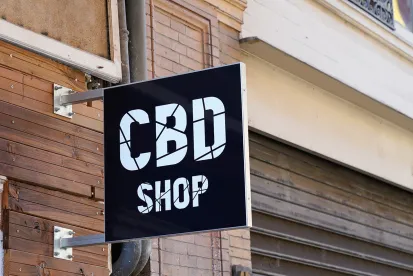Much like the ambiguous landscape involving cannabidiol (CBD) products on the consumer market, an influx of delta-8 THC containing products for consumption has highlighted a recurrent regulatory issue surrounding the legality of hemp derived products at the federal level. The Agricultural Improvement Act of 2018 (the “2018 Farm Bill”), which, among other things, offered a federal definition of hemp and removed it from the list of Schedule I controlled substances, specifically carved out hemp derived products with less than 0.3% delta-9-tetrahydocannabinol (THC) on a dry weight basis, thereby allowing products that meet this definition to flood the consumer markets.
Recently, delta-8 THC, which is less potent than delta-9 THC, but which produces a similar psychoactive effect to marijuana, has entered the mainstream consumer market. Because the restrictions on THC content outlined in the 2018 Farm Bill primarily apply to delta-9 THC products, producers can still legally sell delta-8 THC products in states with no legal marijuana market, so long as they meet the definition of hemp supplied by the 2018 Farm Bill.
In September 2021, the Food and Drug Administration (FDA) issued and updated a consumer advisory outlining consumer safety concerns related to delta-8 products. The consumer advisory highlighted the fact that no delta-8 THC products have been evaluated or approved by the FDA, and many of the methods used to derive delta-8 THC synthetically involve the use of potentially harmful chemicals. The Centers for Disease Control and Prevention issued similar guidance warning consumers of the rise in hospitalization reports and adverse event incidents related to delta-8 THC.
One important question that has lingered in the minds of cannabis industry members and lawyers is whether delta-8 is a federally controlled substance. In a response letter to the Alabama Board of Pharmacy, the U.S. Drug Enforcement Administration (DEA) clarified the control status of delta-8 THC under the Controlled Substance Act (CSA). DEA explained in its letter that “cannabinoids extracted from the cannabis plant that have a Δ9-THC concentration of not more than 0.3 percent on a dry weight basis meet the definition of ‘hemp’ and thus are not controlled under the CSA.” Furthermore, DEA highlighted that THC “synthetically produced from non-cannabis materials” is controlled. According to an FDA Consumer Update, the vast majority of delta-8 THC products on the market are produced through the conversion process of CBD, and some have interpreted DEA’s statements to suggest that delta-8 products produced from hemp-derived CBD are excluded from the CSA. It should be noted that while these statements do appear to offer more clarity surrounding the regulatory status of delta-8 products, the DEA Alabama Board of Pharmacy letter operates as a non-binding policy statement on behalf of the agency. Furthermore, this statement at the federal level does nothing to hinder the banning or restriction on use of delta-8 products at the state level, where many states have already enacted legislation to restrict access to such products.
In addition to this already challenging regulatory landscape for delta-8 THC products, on May 4, 2022, the FDA issued five warning letters to companies for selling products containing delta-8 THC. This marked the first time FDA has issued warning letters specifically for products containing delta-8 THC. Similar to FDA’s enforcement actions surrounding CBD products, the warning letters focus on the illegal marketing of unapproved delta-8 THC products by companies as treatments of medical conditions or for other therapeutic uses. The letters cite violations to the Food, Drug and Cosmetic Act (“FDCA”) relating to the marketing of unapproved new drugs, drug misbranding and the use of delta-8 THC as an unapproved food additive.
The cited warning letters targeted companies that allegedly violated the FDCA by including delta-8 THC in either a food or dietary supplement that also included unlawful drug claims about those products’ efficacy and utility in treating medical conditions. Some of the unlawful drug claims cited by the FDA in the warning letters include:
“If you have cancer, rheumatoid arthritis, and migraines, delta-8 THC can help alleviate pain because it has immunosuppressant properties.”
“Fighting Cancer . . . Δ8 may also have cancer-fighting properties . . . [t]he researchers treated mice with cancer for 20 consecutive days with a combination of the isomer and cannabinol. The result? Tumors reduced in size.”
FDA concluded through these warning letters that the cited drug claims classify these products as unapproved new drugs because they are intended for use in the diagnosis, cure, mitigation, treatment, or prevention of disease, and/or intended to affect the structure or any function of the body. In addition to labeling the products as unapproved new drugs, the warning letters emphasize these products are also misbranded because they are not labeled with adequate directions for use. Finally, FDA concluded that the addition of delta-8 THC in the case of food products classified the ingredient as an unapproved food additive, as the companies did not submit safety data to the FDA for the ingredient to be approved as a generally recognized as safe (“GRAS”), and therefore, lawful ingredient.
The recent slew of warning letters issued by the FDA targeting delta-8 THC products could signal a shift in agency enforcement action around hemp-derived products. Producers of CBD and delta-8 THC products should consider current marketing practices and claims made regarding the utility of these ingredients in their products to avoid scrutiny by regulators.



 />i
/>i

